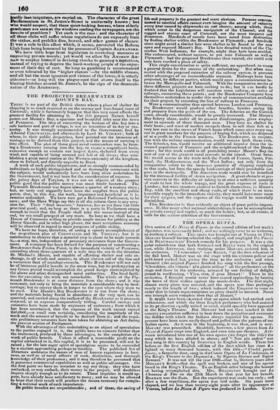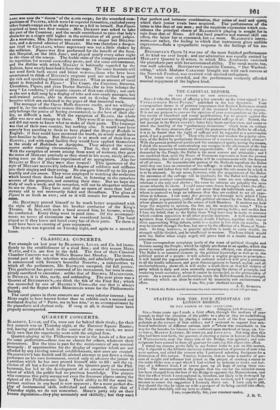TIIE OPERA BUFFA.
Ova notice of Lc Nozze di Figaro, in the second edition of last week's Spectator, was necessarily brief; and we willingly recur to so welcome, so inviting a subject. This opera was brought out at Vienna in 1781; .Mozene himself having selected the subject, and employbd DA Pone to fit BEAVMARCHATS' French comedy for his purpose. It was a sin- gular coincidence that both Ssonece and KELLY were in the original cast, while ATTWOOD, then studying under Mozees, assisted him in the orchestra. " 1 remember," says KELLY, "at the first rehearsal of the full band, Mozart was on the stage with his crimson pelisse and gold-laced cocked hut, giving the time to the orchestra : and when Benucci (the original Figaro) finished his song with the fine passage, 'Cherubino, alit vittoria! elle gloria all the performers on the stage and those in the orchestra, actuated by one feeling of delight, joined in vociferating, ' Viva, viva, it gran Mozart!' lhose in the orchestra, I thought would never have ceased applauding, by beating the bows of their violins against the music-desks. The first night, almost every piece was encored, and the opera was thus prolonged nearly to time length of two ; which induced the Emperor to issue an order that in future representations no piece should be encored. Never was triumph more complete than that of Mozart." It might. have been expected that an opera which had excited such enthusiasm, and which the three English performers who had assisted in its production equally united to extol, would speedily have appeared at the King's Theatre. But Mozeur had not then reached in this country a reputation sufficient to beat down the prejudice and overcome the dislike with which the Italians always regarded his operas. No persons have been more easily duped and gulled than the patrons of our Italian opera. As it was in the beginning, it was then, and is now. MOZART was proscribed. Stealthily, however, a few pieces from Le Nozze di Figaro crept into England, and even into our theatres. Arr. wool) introduced into one of his own operas (we forget the title) the song which we have alluded to above; and " Non pit: undrai" was first sung in this country by SEDGWICK to English words. There lies before us the first English edition of the duet which has since J.- lighted so many thousand bearers, with this title—" Crudel, perehe finora ; a favourite duet, sung in theComic Opera of La Vendemnda, at the King'.; Theatre in the HaymarLe by Signora Storace and Signor Benucci." It was not till the year 1806—that is, thirteen years after Moznar's death—that the spell was broken, and one of his operas beard in the King's Theatre. To tin English artist belongs the honour of having accomplished this. Mrs. Blestsceos: brought out La Cletnenza di Tito on the 27th March in that year for her benefit. DRARAM was the Sesto. But the experiment was made too early; and after a few repetitions, the opera was laid aside. Six years more elapsed, and no less than twenty-eight years after its appearance at Vienna, before Le Now di Figaro was produced in London. CATA. tam was now the " donna" of the wore corps; for the wretched-coar, positions of PUCITTA, which were I er especial favourites, excluded every other female except such as might serve as a foil to herself. But Figaro required at least two first women : Mrs. DICKONS was asked to take the part of the Countess ; and the result contributed to raise that lady's character as a singer still higher in the estimation of all good judges. As a musician, Mrs. DICIONS was second to no singer but Bru.nve Ton, and a devoted admirer of Mozater. She was therefore a danger- ous rival to CATALANI, whose supremacy was not a little shaken by the collision. Figaro was first performed for the benefit of the Scot- tish Hospital, on the 18th June ; and played nearly every other night to the close of the season. The feeble state of the company prevented its repetition for several succeeding years ; and the same circumstance, and the dislike with which MOZART is habitually regarded by the Italians, have nearly banished it from the stage. The same fountain will not send forth both sweet and bitter waters—those who have been accustomed to drink of BELLINI.S stagnant pool are unfitted to quaff the rich and sparkling fountain of Mozawr. What an amount of vocal talent is demanded in Figaro ! The Count, the Countess, Susanna, Cherubino, Figaro, and even Doctor Bartolo, (for to him belongs the song " La vendetta,") all require singers of first-rate ability ; not such as eke out a dull song by a display of trite and ever-ready passages, but well-trained artists, able to discern and to develop the thousand beauties which are enshrined in the pages of that immortal work. The manager of the Opera Buffa deserves credit, and we willingly award it, for the endeavour to restore this opera. To the singers gene. rally belongs the praise of having encountered, to the best of their abi- lity, so difficult a task. With the exception of BLASIS, the whole affair was new and strange to them. They were ill at ease throughout, and did not seem to know what to make of their parts. The language was that of their own country, but nothing else. It would have been scarcely less puzzling to them to have played the Siege of Rochelle in English: if they could have mastered the words, its music would have been familiar to them. But MOZART is as much out of their line as HANDEL; and with equal facility they would have applied themselves to the study of Rodelinda or Agrippina. They adopted the wisest course under existing circumstances. Tbat is, they did nothing. With the exception of errors arising from want of memory, they gave the notes of MOZART precisely as they stand in his score, rarely adven- turing even on the perilous experiment of an appogiatura. Alas for BELLINI or Rica if they were thus treated ! This ignorance of the style of MOZART necessarily infused a degree of coldness and stiffness into their singing and their acting. No one gave himself up to his part heartily and con amore. They were employed in watching the orchestra which bound them down hand and foot, in listening to the ceaseless accents of the prompter, and counting their time. But we hope the study of such a work, and its reception, will not be altogether without its use to them. They have seen that an opera of more than half a century old is not necessarily faded and threadbare. The gloss of Figaro is as fresh as ever ; and so it will remain for generations to come.
Mr. BENEDICT proved himself to be much better acquainted with the style of MOZART than his brother conductor of the King's Theatre. In fact, with such a band around him, he became, wisely, the conducted. Every thing went in good time. Of the accompani- ments no terms of encomium can be considered lavish. The band played as if they knew and loved every bar of their parts. To them it must have been an evening of pure enjoyment.
The opera was repeated on Tuesday night, and again to a crowded house.



























 Previous page
Previous page